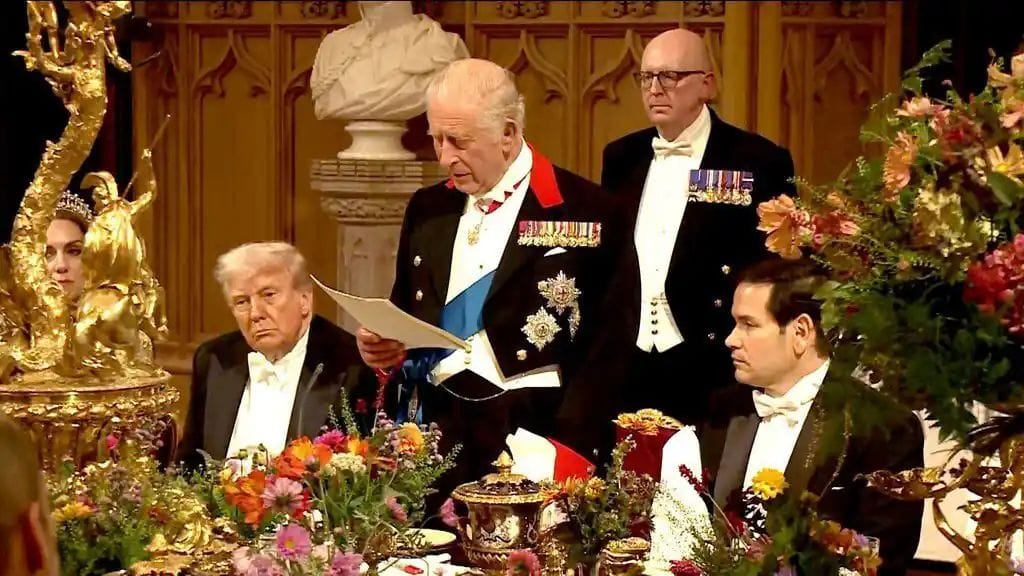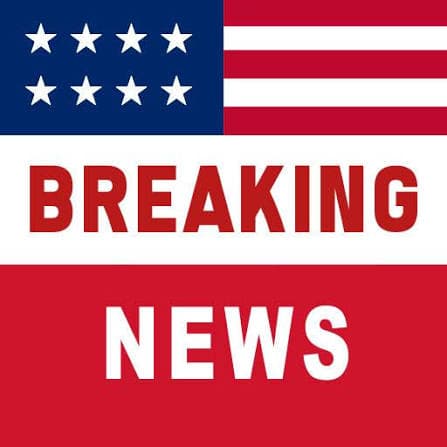The Trump state visit to the United Kingdom reached its symbolic peak at a glittering Windsor banquet, where King Charles delivered a powerful address praising the resilience of the UK-US bond and commending President Donald Trump’s “commitment to ending wars.” The evening combined pageantry, political nuance, and international symbolism, reaffirming the historic “special relationship” between Britain and the United States.
Ceremony with Purpose
Windsor Castle provided the grand setting for the second Trump state visit. Guests included senior royals, government officials, and industry leaders, who dined beneath the splendour of St. George’s Hall. Yet behind the royal pomp, the gathering carried a message: in turbulent global times, the alliance between Britain and America remains central to peace, prosperity, and shared democratic values.
King Charles opened his Windsor banquet speech by acknowledging the sacrifices that had bound the two nations together in past conflicts, from the trenches of Europe to joint modern-day operations. He noted that cooperation across the Atlantic has not only secured safety but also fostered innovation, trade, and cultural exchange.
Reflecting on history, the King reminded his audience of the 250th anniversary of the US Declaration of Independence—an event that once divided Britain and America but has since become a cornerstone of unity. The monarch stressed that the alliance has matured into a partnership that now defines global order.

Praising Trump’s Peace Efforts
Perhaps the most striking moment of the King Charles speech came when he directly praised President Trump’s diplomatic record. He commended Trump’s “commitment to ending wars” and highlighted ongoing efforts to resolve conflicts in regions plagued by instability. By acknowledging these efforts, the King positioned Trump not only as a statesman but as a leader tasked with guiding peace in an unsettled world.
Observers noted that the comment was both a diplomatic compliment and a moral challenge, urging America to continue using its power for peacemaking. In an era where conflicts in Ukraine, Gaza, and elsewhere dominate headlines, the King’s words underscored the responsibility borne by global powers.
Trump’s Response: Unity and Optimism
In his reply, President Trump described the UK-US bond as “unbreakable, priceless, and eternal.” He went further, arguing that the relationship is not just “special” but “unique,” unlike any other bilateral tie in the world.
Trump also paid personal tribute to King Charles, Queen Camilla, Prince William, and Princess Catherine, praising their dedication and moral strength. He called the British monarchy “a source of inspiration” and said the institution continues to embody “the spirit of resilience that unites our peoples.”
Turning to domestic matters, Trump contrasted his current presidency with that of his predecessor, declaring that the United States is “no longer sick, but the hottest economy anywhere in the world.” Yet his strongest emphasis remained on shared values: liberty, democracy, and mutual defence. He reminded guests that Britain and America have repeatedly stood “shoulder to shoulder” in wars, trade, and cultural leadership.
Political Undercurrents
While the Trump state visit was celebrated with splendour inside Windsor Castle, controversy swirled outside. Liberal Democrat leader Sir Ed Davey publicly boycotted the banquet, urging Prime Minister Keir Starmer to raise the issue of Gaza with Trump. He argued that political leaders cannot separate ceremony from humanitarian responsibility.
Meanwhile, thousands of protesters gathered outside Windsor, voicing opposition to the visit and drawing attention to conflicts abroad. Placards, chants, and speeches contrasted sharply with the elegance inside the castle, reminding the world that international diplomacy is never free from domestic dissent.
Themes from the Windsor Banquet
The evening highlighted several enduring themes:
- Peace as Priority – King Charles’s focus on “ending wars” brought moral urgency to the evening, placing peace at the centre of the UK-US bond.
- Unity Beyond Politics – Both leaders emphasised cultural and historical ties that transcend governments or parties.
- Symbolism of Pageantry – The banquet itself reinforced the soft power of tradition, projecting unity through ceremony.
- Tensions and Protest – Boycotts and demonstrations showed that diplomacy remains intertwined with global crises.
Why This Visit Matters
State visits are rarely about immediate policy outcomes. Instead, they serve as moments of symbolic reaffirmation. For Britain, the Trump state visit underscores the nation’s ongoing relevance on the world stage, reinforcing its alignment with its closest ally. For Trump, it offers a platform to showcase international leadership and to frame himself as a peacemaker while strengthening ties with a royal family that continues to command global attention.
By praising Trump’s dedication to peace, King Charles effectively set a benchmark: the United States must live up to its responsibility as a global guarantor of stability. Both leaders recognised that democracy, prosperity, and security are at risk in an unstable world, making their alliance more necessary than ever.
Conclusion
The Trump state visit to Windsor Castle demonstrated that the UK-US bond is more than rhetoric—it is a partnership forged in history and reaffirmed in modern challenges. The King Charles speech struck a balance between tradition and urgency, celebrating shared values while pushing for a future centred on peace. Trump’s response reinforced the idea that the relationship is unique, unbreakable, and essential to both nations.
At its heart, the evening was about more than ceremony. It was about responsibility, unity, and the hope that two nations with centuries of shared history can help shape a safer, more peaceful world. The grandeur of the Windsor banquet will fade, but its message—that partnership must be renewed and peace must be pursued—will continue to resonate.
More nnews at Swiftreportnow


